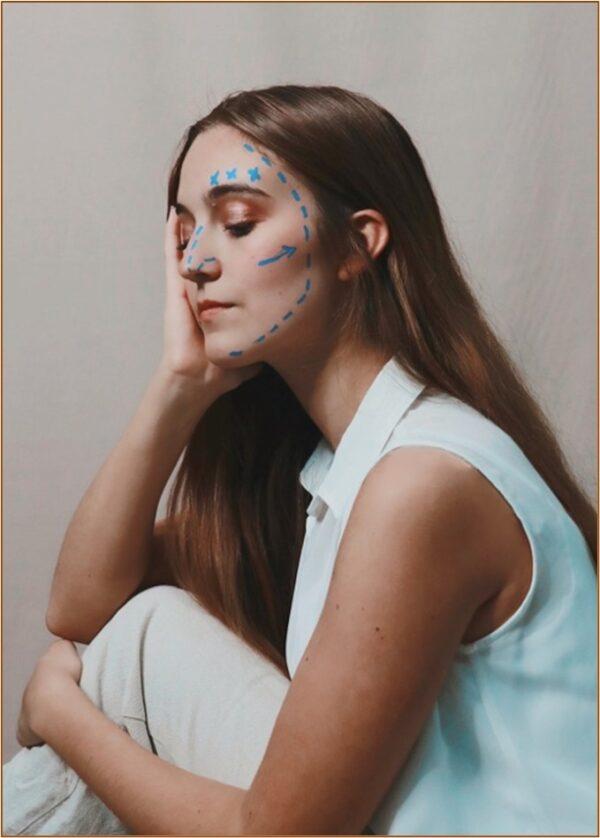
While Instagram used to be a casual platform to share quick snapshots with friends, it has turned into a perfectly curated stream of highlight reels. Like many young people, 21-year-old Sky Lane heavily edits her photos before posting them to social media. Lane’s main goal is to appear skinnier, but also focuses on smoothing her skin and whitening her teeth. She edits almost every aspect of her photo, tweaking her eyebrows, nose, jaw, and body. After taking a simple photo of herself, she uses the “Reshape” tool to “push her tummy inward, little by little [but has] to be careful not to noticeably warp the background in the process” (Cook, 2021).
Facetune was released in 2013 by a group of five Israeli computer science Ph.D. students (Jennings, 2019). Their face-editing app was downloaded by 4.5 million users in two years while their second app (Facetune 2) has been downloaded 20 million times, with some users even paying regular subscription fees (Jennings, 2019). Despite widespread use of Facetune, deep disagreement persists about the ethical usage of the app. Indeed, while some view the app as an inevitable and ultimately harmless use of technology, others believe it could have disastrous effects on the physical and mental health of social media users.
In a column with Grazia, Georgia Aspinall explains that she was once an avid Facetune user. Over time, she accidentally became addicted to the photo-altering app that could give her “virtual cosmetic surgery” (Aspinall, 2020). Because Facetune could quickly and easily make her look “perfect,” she had a difficult time quitting the app; she eventually realized that “All I was telling myself by looking at that version of myself was that the real me isn’t good enough” (Aspinall, 2020). Aspinall believes others should follow suit and work to stop using Facetune altogether because it inaccurately represents what normal bodies and faces look like in real life. In this sense, Facetune contributes to the perpetuation of unrealistic beauty standards and has the potential to lead to deep-seeded insecurity, body dysmorphia, disordered eating, and long-term mental health issues. Though most people are already confronted with unrealistic beauty standards from traditional media sources like Hollywood and magazines, these same ideals may be even more pervasive when they come through the lens of being a regular person online. In fact, a recent study offers evidence to corroborate these claims of widespread insecurity, as results show that 71% of social media users do not want to post photos of themselves online without editing them first (Aspinall, 2020).
However, others are not convinced that Facetune is particularly dangerous. For example, TikTok influencer and makeup artist Lucas Rogers believes that a “look is never complete w[ith] out a smidge of Facetune” (Rogers, 2022). In other words, Rogers believes that Facetune is integral in creating beautiful images that show off his artistic makeup skills. With the help of a simple app, he is able to post pictures that he is extremely proud of, which also leads to more validation on social media apps. Similarly, regular Facetune user Sky Lane hardly thinks twice about her editing process. Though she is actively trying to make the photo look unedited, she also believes Facetune usage is so common that most social media users already assume everything is edited online: “Who doesn’t use Facetune?” (Cook, 2021). Especially in “a generation that has never known a world that isn’t filled with digitally manipulated images,” if it is already common knowledge that Instagram and other social media platforms function as “highlight reels,” then Facetune is simply enhancing already curated images (Jennings, 2019).
With so many factors involved, ethical questions about the use of Facetune will continue to arise. On one hand, individuals are allowed to follow whoever they want, use any apps they want, and many already understand that most images on social media are heavily edited. On the other hand, while many might think they know social media isn’t a direct reflection of reality, the never-ending barrage of impossible-to-meet beauty standards ultimately may have a problematic effect on many. Do we have a responsibility to encourage the representation of real faces and bodies, or is the perpetuation of beauty ideals inevitable? Is Facetune something we can and should mitigate or will the never-ending pursuit of perfection prevail?
Discussion Questions:
- What values are in conflict when we consider the ethics of using Facetune?
- How is altering your look or image with Facetune different from altering it through makeup or lighting?
- What obligations do the creators and owners of an app like Facetune have to their users and society? What guidelines ought they to follow in creating such an app?
- What are some guidelines for the ethical use of apps like Facetune? Explain how and why users ought to employ the app in certain ways.
Further Information:
Aspinall, Georgia. (August 13, 2020). “‘I Was Obsessed with Facetune:’ 71% of People Won’t Post a Picture Online without Photoshopping It – That Needs to Change.” Grazia. Available at: https://graziadaily.co.uk/life/in-the-news/photoshop-instagram-facetune/.
Cook, Jesselyn. (June 4, 2021). “Selfies, Surgeries and Self-Loathing: Inside the Facetune Epidemic.” HuffPost. Available at: https://www.huffpost.com/entry/facetune-selfies-surgeries-body-dysmorphia_n_60926a11e4b0b9042d989d48.
Rogers, Lucas (@lucasrodgerss). (November 12, 2022). Comment on Instagram post by @facetune. Available at: https://www.instagram.com/p/Ck3sO0IIRMa/?hl=en.
Jennings, Rebecca. (July 16, 2019). “Facetune and the Internet’s Endless Pursuit of Physical Perfection.” Vox. Available at: https://www.vox.com/the-highlight/2019/7/16/20689832/instagram-photo-editing-app-facetune.
Authors:
Mia Etem, Kat Williams, & Scott R. Stroud, Ph.D.
Media Ethics Initiative
Center for Media Engagement
University of Texas at Austin
May 8, 2023
Image by Joeyy Lee on Unsplash
This case was supported by funding from the John S. and James L. Knight Foundation. It can be used in unmodified PDF form in classroom or educational settings. For use in publications such as textbooks, readers, and other works, please contact the Center for Media Engagement.
Ethics Case Study © 2023 by Center for Media Engagement is licensed under CC BY-NC-SA 4.0




